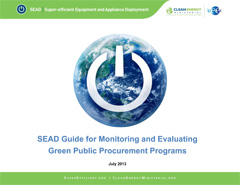25 September 2013
View Webinar Content
Presentation: Introduction to the webinar and panelists
Presentation: SEAD: Super Efficient Appliance Deployment Initiative
Presentation: Monitoring Sustainable Acquisition by the U.S. Department of Energy
Presentation: Monitoring and Evaluation of Green Public Procurement Programs
Presentation: Monitoring Green Public Procurement in the EU
Presentation: Monitoring and Evaluating Green Public Procurement in the Republic of Korea
Transcript—Webinar audio transcript
See Also
To learn more more, see the SEAD Guide for Monitoring and Evaluating Green Public Procurement Programs or the other webinar in this series: Energy Efficient Public Procurement: Best Practice in Program Delivery.
The Solutions Center partnered with the Super-efficient Equipment and Appliance Deployment (SEAD) initiative to provide this webinar-based training on key findings from the recently published SEAD Guide for Monitoring and Evaluating (M&E) Green Public Procurement Programs. The presentation included an overview of current practices, highlighted international practices and summarized lessons to improve the effectiveness of procurement monitoring and evaluation practices. Representatives from South Korea and the United States presented case studies that show leadership and innovation in implementing M&E systems.
Over the last several years, an increasing number of governments have begun implementing Green Public Procurement (GPP) and Energy Efficient Procurement (EEP) programs. These programs can demonstrate leadership, reduce the environment impacts of products, mitigate climate change, improve resource efficiency, reduce energy use, and encourage environmentally sustainable economic growth. This guide will serve as a resource for policymakers as they continue to develop and implement these programs and track progress against set targets and objectives.
Key lessons for policymakers from the SEAD M&E guide include:
- Embed M&E requirements in policy when the policy is designed
- Create M&E systems that utilize existing processes and tracking systems and require available data
- Communicate results through easy to understand indicators
- Increase compliance through economic and/or reputational incentives and by integrating EEP/GPP into existing management systems.
Panelists
 Aure Adell, Ecoinstitut S.C.C.L.
Aure Adell, Ecoinstitut S.C.C.L.
Ms. Aure Adell holds a degree in Environmental Science and is member of Ecoinstitut since 2001. One of her main areas of expertise is sustainable public procurement (SPP), from the analysis of SPP policies and strategies at local, national and international level to the direct support to public and private organizations in its implementation (tender greening, training in different countries and types of organizations, etc.). She has participated in the development of the first version of the European Commission Green Public Procurement (GPP) Training Toolkit; has organized business seminars to coordinate the supply and demand side of green products; coordinated the review of the implementation of the Marrakech Task Force Approach to Sustainable Public Procurement in seven developing countries (Chile, Uruguay, Costa Rica, Colombia, Tunisia, Lebanon and Mauritius) for UNEP providing recommendations for its improvement as well as policy conclusions; and is the lead author of the SEAD Guide on monitoring and evaluating GPP Programs.
 Shabnam (Shab) Fardanesh, U.S. DOE
Shabnam (Shab) Fardanesh, U.S. DOE
Shabnam (Shab) Fardanesh is the Greenhouse Gas Reduction and Sustainable Acquisition Coordinator at the U.S. Department of Energy (DOE) Office of Sustainability Support. She is a nationally recognized subject matter expert in environmental sustainability, fleet management, and alternative fuel technologies. In 2009-10, Shab served as a Senior Program Manager for the Office of the Federal Environmental Executive at the White House Council on Environmental Quality, assisting in Executive Order (EO) 13514 implementation with a special emphasis on sustainable transportation. She also served in the Energy Branch of the Office of Management and Budget in 2005, working on energy efficiency projects. Shab has managed compliance activities and drafted guidance documents for the federal agencies in meeting fleets’ requirements under the Energy Policy Act (EPAct) of 1992, EPAct 2005, EO 13149, and EO 13423. Shab also chaired the Interagency Committee on Alternative Fuels and Low Emission Vehicles (INTERFUEL), comprised of energy and environmental officials from more than 30 agencies, from 2000 to 2007, coordinating policy and programs for fleet sustainability and environmental management. She has received the White House Closing the Circle Award for Leadership in Federal Environmental Stewardship, the CEQ Award for Greening the Federal Fleet, and multiple White House Commendations.
 Hyunju Lee, KEITI
Hyunju Lee, KEITI
Ms. Hyunju Lee earned a master’s degree in Political Science and joined KEITI since 2013. She is engaged in the UNEP-led ASEAN+3 Green Public Procurement (GPP) and Ecolabelling (EL) capacity development project which embarked early this year in collaboration with China and Japan. As part of it, she is working on the development of a training programme building on Korea’s experiences in the implementation of GPP/EL. Before KEITI, she worked as a consultant at UNESCAP and participated in the project Low Carbon Green Growth Roadmap for Asia and the Pacific.

